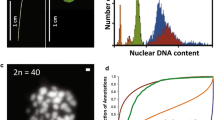
Overview
- Describes duckweeds: the fastest-growing, most widely distributed, and morphologically reduced angiosperms on the planet
- Covers the latest findings in modern genetics, epigenetics, cytogenetics, transcriptomics, proteomics and genomics research concerning all 5 genera of duckweeds: Spirodela, Landoltia, Lemna, Wolffiella, and Wolffia
- Details the nuclear and organelle genome sequences of Spirodela polyrhiza, which is the smallest, least methylated and least transposon-rich monocot genome sequenced to date
- Is the only book to date dedicated to the genomics of this basal monocot family
- Stresses the importance of duckweeds as an aquatic plant model and as an extensive resource for biotechnological applications
- Elucidates on the impact of whole genome sequencing, omics studies, and genome editing on future basic and applied research on duckweed
Part of the book series: Compendium of Plant Genomes (CPG)
Access this book
Tax calculation will be finalised at checkout
Other ways to access
About this book
The duckweed or Lemnaceae family is a collection of 5 genera and 37 species of the smallest, fastest-growing flowering plants. Many of these aquatic monocotyledonous plants can grow all over the world, in a variety of climates. Given their simplified and neotenous morphology, duckweeds have been researched for several decades as a model species for plant physiology and ecotoxicological research, contributing to our understanding e.g. of flowering response, plant circadian systems, sulfur assimilation pathways and auxin biosynthesis. In addition, duckweed-based treatment has been a favorite and feasible means, especially in developing countries, of removing phosphorus and pharmaceutical chemicals from sewage and wastewater.
With a dry annual mass yield per hectare of up to 80 tonnes (equivalent to 10 tonnes of protein), duckweed is also a promising aquatic crop in new modern and sustainable agriculture. Besides being an excellent primary or supplemental feedstock for the production of livestock and fish, duckweed biomass can be utilized as a potential resource for human nutrition, biofuel, or bioplastics, depending on water quality as well as protein or starch accumulating procedures. These academic and commercial interests have led to international efforts to sequence the Spirodela polyrhiza genome, the smallest and most ancient genome in the family.
Similar content being viewed by others
Table of contents (18 chapters)
-
Front Matter
Editors and Affiliations
About the editors
Accessibility Information
Accessibility information for this book is coming soon. We're working to make it available as quickly as possible. Thank you for your patience.
Bibliographic Information
Book Title: The Duckweed Genomes
Editors: Xuan Hieu Cao, Paul Fourounjian, Wenqin Wang
Series Title: Compendium of Plant Genomes
DOI: https://doi.org/10.1007/978-3-030-11045-1
Publisher: Springer Cham
eBook Packages: Biomedical and Life Sciences, Biomedical and Life Sciences (R0)
Copyright Information: Springer Nature Switzerland AG 2020
Hardcover ISBN: 978-3-030-11044-4Published: 08 January 2020
eBook ISBN: 978-3-030-11045-1Published: 07 January 2020
Series ISSN: 2199-4781
Series E-ISSN: 2199-479X
Edition Number: 1
Number of Pages: XVIII, 185
Number of Illustrations: 9 b/w illustrations, 21 illustrations in colour
Topics: Plant Genetics and Genomics, Plant Breeding/Biotechnology, Agriculture



